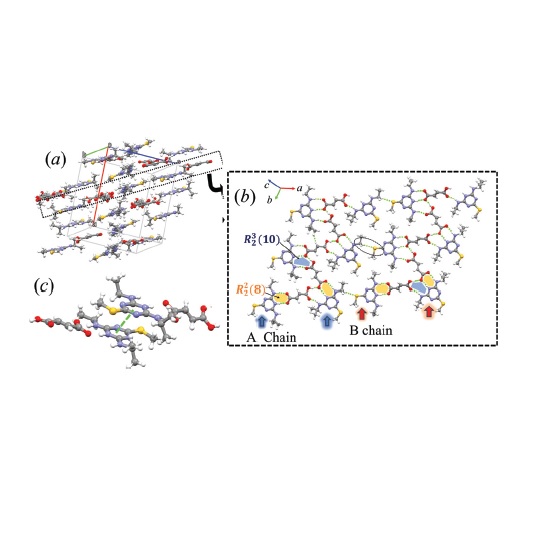Highly water soluble agrichemicals by using engineered organic salts for reducing adverse environmental impacts.
CARVALHO JUNIOR, Paulo S.; GUIMARÃES, Gelton G. F.; DINIZ, Luan Farinelli; ELLENA, Javier; OLIVEIRA, Cauê Ribeiro.
CARVALHO JUNIOR, Paulo S.; GUIMARÃES, Gelton G. F.; DINIZ, Luan Farinelli; ELLENA, Javier; OLIVEIRA, Cauê Ribeiro.




 Abstract: Although herbicides are essential for ensuring high crop yields, the development of sustainable formulations remains a challenge in modern agriculture. Herbicide use is typically affected by the poor water solubility of the compounds they contain, and so they are often applied at very high doses that exceed those needed for weed control (WC). Highly soluble herbicides allow application without the excessive formation of undissolved solids, but only a few routes have been developed for this purpose. Herein, a crystal engineering approach is presented for improving the solubility of the herbicide ametryn (AMT). Organic salts of AMT with fumaric acid (m.p. ~ 135 °C) and maleic acid (m.p. ~ 125 °C) were successfully prepared, providing substantial improvement in the solubility (10-fold and 20-fold, respectively), compared to pure AMT, along with thermal stability. Herbicidal activity tests confirmed the effectiveness of these systems, which showed good WC performance at 1 kg ha-1, considerably below the 2.5 kg ha-1 for AMT. The results demonstrate that these systems offer an accessible technology for reducing the use of AMT in agricultural practices and a strategy for the design of new WC chemistries.
Abstract: Although herbicides are essential for ensuring high crop yields, the development of sustainable formulations remains a challenge in modern agriculture. Herbicide use is typically affected by the poor water solubility of the compounds they contain, and so they are often applied at very high doses that exceed those needed for weed control (WC). Highly soluble herbicides allow application without the excessive formation of undissolved solids, but only a few routes have been developed for this purpose. Herein, a crystal engineering approach is presented for improving the solubility of the herbicide ametryn (AMT). Organic salts of AMT with fumaric acid (m.p. ~ 135 °C) and maleic acid (m.p. ~ 125 °C) were successfully prepared, providing substantial improvement in the solubility (10-fold and 20-fold, respectively), compared to pure AMT, along with thermal stability. Herbicidal activity tests confirmed the effectiveness of these systems, which showed good WC performance at 1 kg ha-1, considerably below the 2.5 kg ha-1 for AMT. The results demonstrate that these systems offer an accessible technology for reducing the use of AMT in agricultural practices and a strategy for the design of new WC chemistries. @article={002980313,author = {CARVALHO JUNIOR, Paulo S.; GUIMARÃES, Gelton G. F.; DINIZ, Luan Farinelli; ELLENA, Javier; OLIVEIRA, Cauê Ribeiro.},title={Highly water soluble agrichemicals by using engineered organic salts for reducing adverse environmental impacts},journal={Green Chemistry},note={v. 21, n. 23, p. 6419-6429},year={2019}}
@article={002980313,author = {CARVALHO JUNIOR, Paulo S.; GUIMARÃES, Gelton G. F.; DINIZ, Luan Farinelli; ELLENA, Javier; OLIVEIRA, Cauê Ribeiro.},title={Highly water soluble agrichemicals by using engineered organic salts for reducing adverse environmental impacts},journal={Green Chemistry},note={v. 21, n. 23, p. 6419-6429},year={2019}}